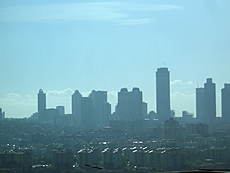
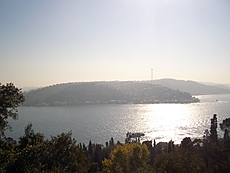
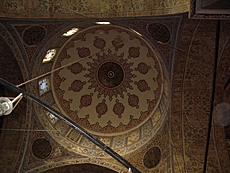
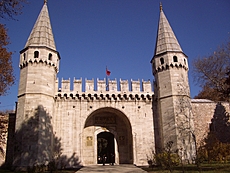
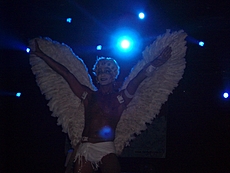
Istanbul was Constantinople.
Now it's Istanbul, not Constantinople.
Been a long time gone, Constantinople.
Why did Constantinople get the works?
That's nobody's business but the Turks. --Kennedy/Simon (performed by The Four Lads, They Might Be Giants, etc.)
I collaborate with a lot of Turkish colleagues here at the University of Washington as part of the Genetically Engineered Materials Science and Engineering Center (GEMSEC). I finally made it to Istanbul to give a talk about our research at a conference on Molecular Biomemetics and Bionanotechnology at Istanbul Technical University (ITU). As usual, it was an incredible experience.
It all started with me staying out at Taksim Square, which is the heart of the city. Istanbul is in a lot of ways very similar to Bangkok, but probably more violent. My first two nights were very active.
Jet lagged, I went to my conference at ITU and gave my talk there:
Our hosts treated us like royalty and we were shown around everywhere. Specifically we went to the Blue Mosque first which was established by the Ottoman Turk empire:
We then went to St. Sophia's Church (which became a mosque and is now a museum) established by the Byzantine empire (which came before the Ottoman Turk empire, for the record). The interesting thing about St. Sophia's Church is that a lot of the beautifully tiled Christian images were "overwritten" when the Ottoman Turks took over (since Muslims do not believe in idolatry). Now they have slowly uncovered what was underneath which makes for an interesting historical lesson about religion (topics I discuss elsewhere on this website)
The next trip was to the Topkapi Palace which stores a huge amount of historical relics and to me illustrates the stupidity of human civilisation. Besides the excess in terms of material items (jewellery, ivory, and other gifts some of which we were not allowed to photograph), there are too many weapons illustrating the wars between the Christian and the Muslims (as a pacifist, I am opposed to all violence). But notable among these was the alleged hand and skull of St. John the Baptist (the person who baptised Jesus Christ) as well as hair from the Prophet Mohammed (and his tomb). Even though I am an atheist, it was fascinating to examine these objects.
Istanbul is a highly interesting historic place whose importance I had not appreciated (and I believe most Americans don't). The Bosphoros Straight is the bridge between Asia and Europe -- in other words, in ten minutes, you can be in Asia, and in another ten, you can be in Europe (for The Simpsons' fans, this reminded me of the whole Australia/America joke).
Because of the control of the Bosphoros Strait which controls the passage between the Black Sea and the Seas of Marmara, Aegian, and the Mediterranean (the narrowest international strait), the empires of Constantinople and Turkey reigned supreme, starting with the Byzantine Empire and the Ottoman Turkish Empire, both of which were equivalent to Rome in their highlight. A lot of control was achieved by people pulling chains across the narrow straits and, of course, people had to pay for passage one way or another. Today, the Bosphoros Strait I believe is considered International territory, something the Turkish government is trying to change. The Bosphoros University (last picture) is located in a beautiful location with an amazing view of the strait
From a cultural/social perspective, Turkey is very liberal and the founder of the new Turkey, who went against the British colonialism, Mustafa Kemal Ataturk (the last name is an honorary title, meaning the founder of Turkey), is revered highly (his date of death was celebrated as a holiday when I arrived in Istanbul), as with Mohandas Gandhi in India. When you visit, you can hardly believe it is a Muslim country and the government is secular (meaning there is freedom of religion). Nonetheless, I found that many people in Turkey, just like in China, work long and hard hours to make little money. A lot of tourists are insulated from these aspects of Istanbul and you just need to get out on your own and explore a little more to figure this out (but it may or may not be safe). Turkey I believe is also a more violent country (relative to, say, a please like Bangkok) from everything I heard, and fraud is rampant.
Istanbul, like I mentioned, is a party city and I had a chance to see Marco V at a venue called Yeni Malek (a former theatre converted into a dance hall). I had already seen Marco V before at the Last Supper Club in Seattle which was an amazing show but this was an opportunity to see him again along with some Turkish DJs who were simply awesome.
My hosts included numerous people, including my collaborators, professors at the ITU, their students, and the sponsors of the conference. I cannot thank them enough for their hospitality.
I also met some new people who were trustworthy. Among them particularly was a guy named Mustafa who is the manager of a restaurant called Cafe Krepin on the Taksim main street. I highly recommend this venue.Overall, Istanbul is one of the places to check out in the world, not just for the history but also if you want to have a great time. The food is excellent as is the nightlife, which is where you truly experience what Istanbul is today in terms of the people and the culture. I highly recommend putting it on your itinerary.
Every gal in Constantinople
lives in Istanbul, not Constantinople.
So if you've a date in Constantinople,
she'll be waiting in Istanbul. --Kennedy/Simon (performed by The Four Lads, They Might Be Giants, etc.)